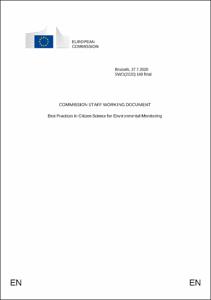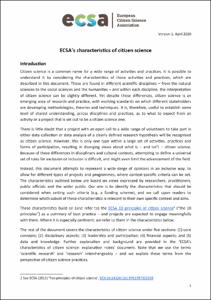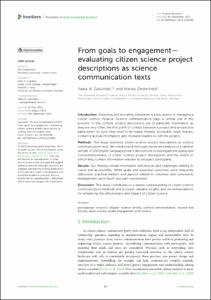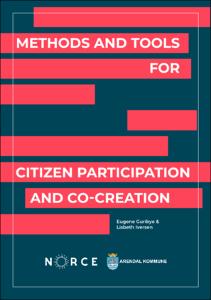Browsing ⇒ ECSA: European Citizen Science Association [and other CS] by Subject "Cross-discipline"
Now showing items 1-5 of 5
-
Best Practices in Citizen Science for Environmental Monitoring: Commission Staff Working Document.
(European Commission, Luxembourg, 2020)The volume of environmental knowledge generated by citizen science initiatives across the EU offers a unique opportunity to help deliver on the European Green Deal and other EU (and global) priorities, and to involve the ... -
ECSA's Characteristics of Citizen Science. Version 1.
(European Citizen Science Association, Berlin, Germany, 2020)This document attempts to represent a wide range of opinions in an inclusive way, to allow for different types of projects and programmes, where context-specific criteria can be set.The characteristics outlined below are ... -
From goals to engagement— evaluating citizen science project descriptions as science communication texts.
(2023)Introduction: Attracting and recruiting volunteers is a key aspect of managing a citizen science initiative. Science communication plays a central role in this process. In this context, project descriptions are of ... -
The impact of citizen science on society, governance, the economy, the environment and science.
(MICS Project, 2022)The MICS project [mics.tools] has developed a state-of-the-art tool for assessing citizen science’s impact. The free-to-use, open-access platform is available to anyone looking to improve their impact assessment. MICS uses ... -
Methods and tools for Citizen Participation and Co-Creation.
(Norwegian Research Centre AS (NORCE), Arendal, Norway, 2020)This document presents a selection of 40 tools or methodologies for citizen involvement in the form of meeting places, participation in planning processes, dialogue through digital tools, knowledge acquisition and new ...
 Repository of community practices in Ocean Research, Applications and Data/Information Management
Repository of community practices in Ocean Research, Applications and Data/Information Management




